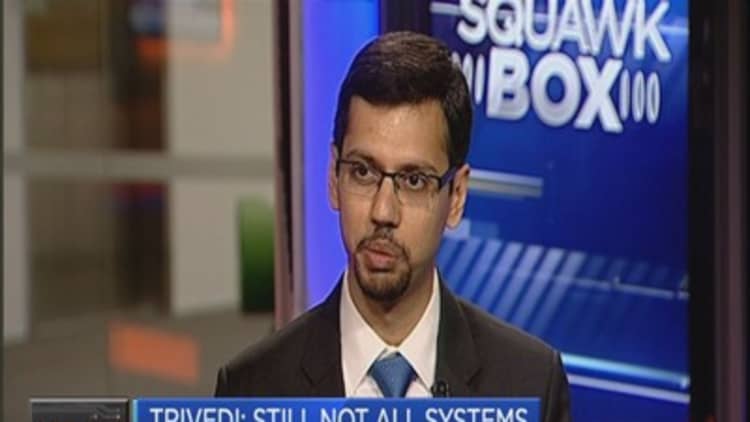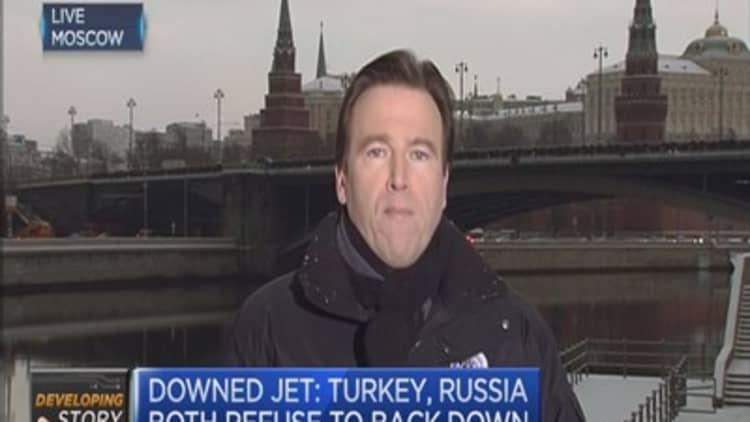



Russia and Turkey have a raft of strategic and commercial trade deals in place which could be at risk as the diplomatic row over Turkey's downing of a Russian warplane continues.
Geopolitical tensions between Russia and NATO member Turkey have risen this week after a Russian SU-24 warplane was shot down by a Turkish F-16 fighter jet on Tuesday. Turkey said the jet was in Turkish airspace and ignored warnings to leave, Russia denies this.
Since the incident a war of words has broken out between the two countries over who was at fault and Russia has threatened to retaliate on an economic level.
On Wednesday, Russian Prime Minister Dmitry Medvedev said Turkey's actions could result in the scrapping of joint projects and that Turkish companies could lose Russian market share.
On Thursday, Medvedev appeared to harden his stance against Turkey, ordering the government to draw up measures which could include freezing some joint investment projects with Turkey, Reuters reported. These could also include restrictions on food imports, he said.
Erdogan responded by saying such talk was "emotional" and "unfitting for politicians," Reuters reported. He added that he was saddened by such statements from Russia.
Read More Russia turns on Turkey in retaliation for downed jet
This could be significant for both countries, Turkey is Russia's second most important trading partner after Germany and, if Russia goes ahead and cuts economic ties, both countries will feel the effects, analysts warn.
CNBC looks at the economic ties that bind Russia and Turkey and the potential impact of the relationship going sour.
Energy
A number of major bilateral trade and infrastructure deals between Turkey and Russia that could be affected, including the proposed construction of a gas pipeline between the two countries, as well as the Akkuyu nuclear power plant.
Russia's economy minister singled out the TurkStream gas project on Thursday, as he discussed plans to halt preparations for a free trade zone with Turkey, Reuters reported.
As one of Russia's largest customers when it comes to energy -- Turkey imports 55 percent of its natural gas from Russia and 30 percent of its oil – any damage to these infrastructure deals could be significant, according to one Turkish academic.
"Turkey has close strategic ties with Russia in terms of energy relationship with Russia, so it may be that the Turkish Stream project as well as the nuclear energy project – which is going to be constructed by the Russians -- could be affected," Professor Gurkan Kumbaroglu from Bogazici University's department of engineering, told CNBC Thursday.
"Now all these projects are uncertain because of this incident," he added. Although Kumbaroglu did not believe gas supplies would be affected in the short-term, he feared for the longer-term projects: "In the longer term those strategic projects may be affected and these projects are actually to the benefit of both countries."
He urged the leaders of Turkey and Russia, President Recep Tayyip Erdogan and President Vladimir Putin, to "stay calm and consider the benefits of the cooperation of the two countries."
Read MoreThis is how much Russia's 'war' in Syria costs
Russia is one of Europe's largest gas provider and whenever a diplomatic spat occurs between it and its western neighbors, you can bet that Russia will attempt to use its energy (and specifically, its gas) supply, as leverage.
It has done so with Europe before, threatening to cut gas supplies to the region, and more recently with its neighbor Ukraine, with whom it is engaged in a bitter regional conflict.
Tourism
Following the downing of the Russian jet on Tuesday, Russia's state tourism agency, Rostourism, wasted no time in recommending suspending sales of tour packages to Turkey following the incident.
According to the latest statistics from Russia's Federal Tourism Agency, 3.6 million Russians visited Turkey in the first nine months of 2013, making it one of the most popular tourist destinations.
Going one step further, Russia's foreign ministry also recommended that Russian citizens do not visit Turkey at all.The economy ministry also said it could restrict air travel to the country, which could land a blow on Turkey's economy that largely relies on tourism.
According to research by the World Travel and Tourism Council (WTTC), travel and tourism generated, either directly or indirectly, $96 billion of Turkey's GDP (gross domestic product) in 2014. The tourism industry also sustained a total of 2.1 million jobs in Turkey, employing more people than the mining, chemicals manufacturing, automotive manufacturing, financial services, and banking sectors, the WTTC said.
Trade
Trade relations between Turkey and Russia have traditionally been strong but these could be one of the first areas to be damaged from a Russian retaliation.
On Thursday, Russia's Agriculture Minister Alexander Tkachev tasked the country's food agency with "reinforcing control over supplies of agricultural produce and food from Turkey," AFP reported, saying that Russia had found multiple cases of Turkish produce not meeting Russian standards.
He noted that Turkish vegetables account for some 20 percent of vegetable imports to Russia and the country could opt to buy produce elsewhere. It also said it could re-direct wheat exports from Russia to Turkey (one the largest buyers of Russian wheat) to elsewhere in the Middle East.
In 2014, according to Turkish foreign trade statistics, exports to Russia were worth $5.9 billion while imports from Russia were worth $25.2 billion.
Erdogan said only in September during a cordial meeting with Putin that Turkey's goal was to raise that bilateral trade volume to $100 billion by 2023. At that meeting, Putin said Russia was "very satisfied with the development of bilateral relations. Our trade and economic relations continue to diversify, investment on both sides also increases," according to news network Russia Today.
The Kremlin said Thursday that it had no plans to place an embargo on food imports from Turkey, according to Reuters, and said it was not considering sanctions.
Although trade relations are now on shaky ground, analysts were sanguine about the long-term relationship. Tina Fordham, chief political analyst at Citi, said that "trade and commercial ties between the two countries are significant," given Russia's energy provision for Turkey and Turkey being a popular tourist destination for Russian holidaymakers.
Read MorePutin meets Hollande: France and Russia getting closer
While trade sanctions were possible, Fordham didn't expect relations to worsen further, however: "Diplomatic meetings have been suspended, and some trade sanctions are possible, but we do not expect disruptions to energy ties at this point," she said in a note Wednesday.
John Bates, Portfolio Manager at Pinebridge, told CNBC that the relationship between Turkey and Russia "is very deeply entrenched," pointing out that there are business links, such as Russian bank Sberbank owning Turkish bank DenizBank.
"I think the key economic drivers shouldn't change too much provided that the diplomatic and political forces don't do anything silly," he said.
- By CNBC's Holly Ellyatt, follow her on Twitter @HollyEllyatt. Follow us on Twitter: @CNBCWorld


